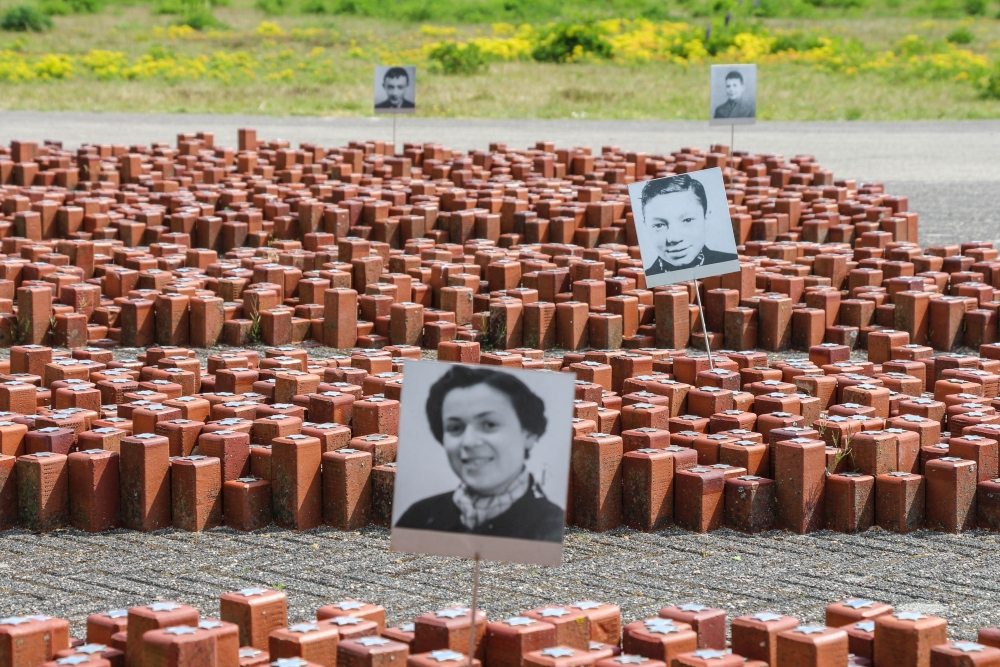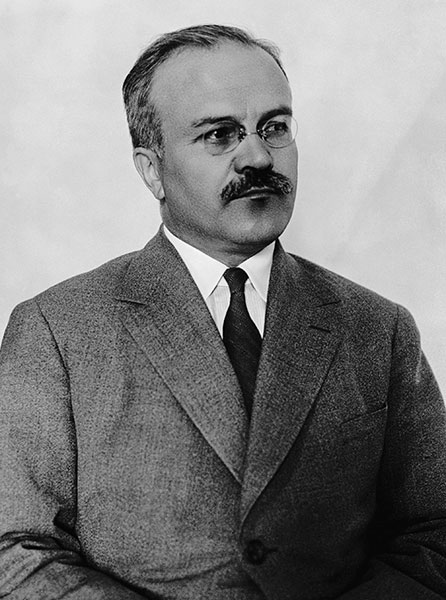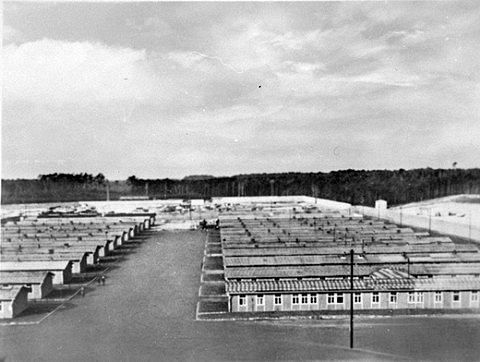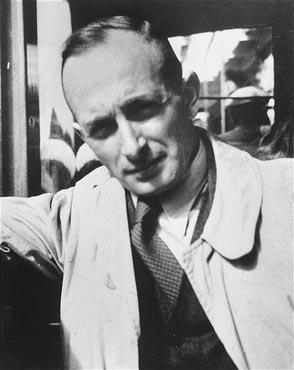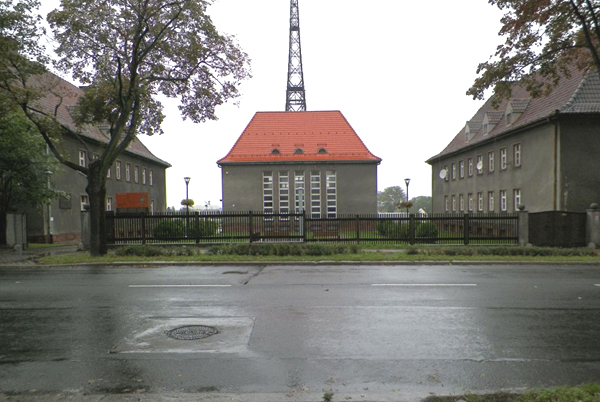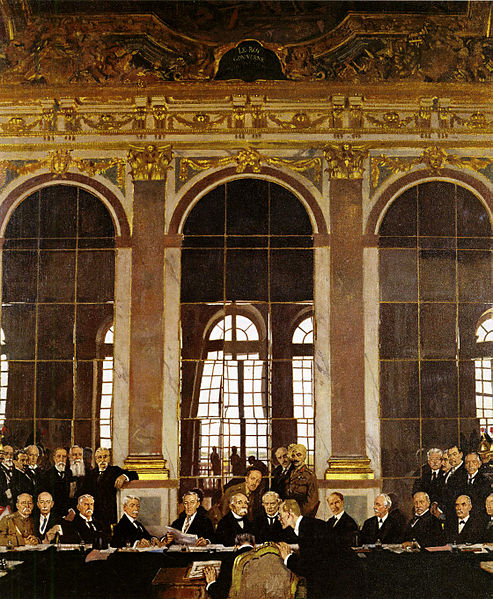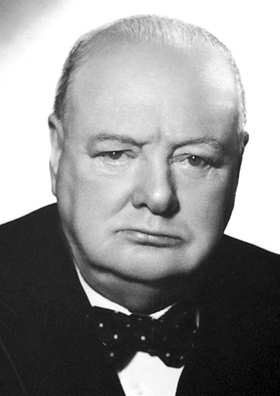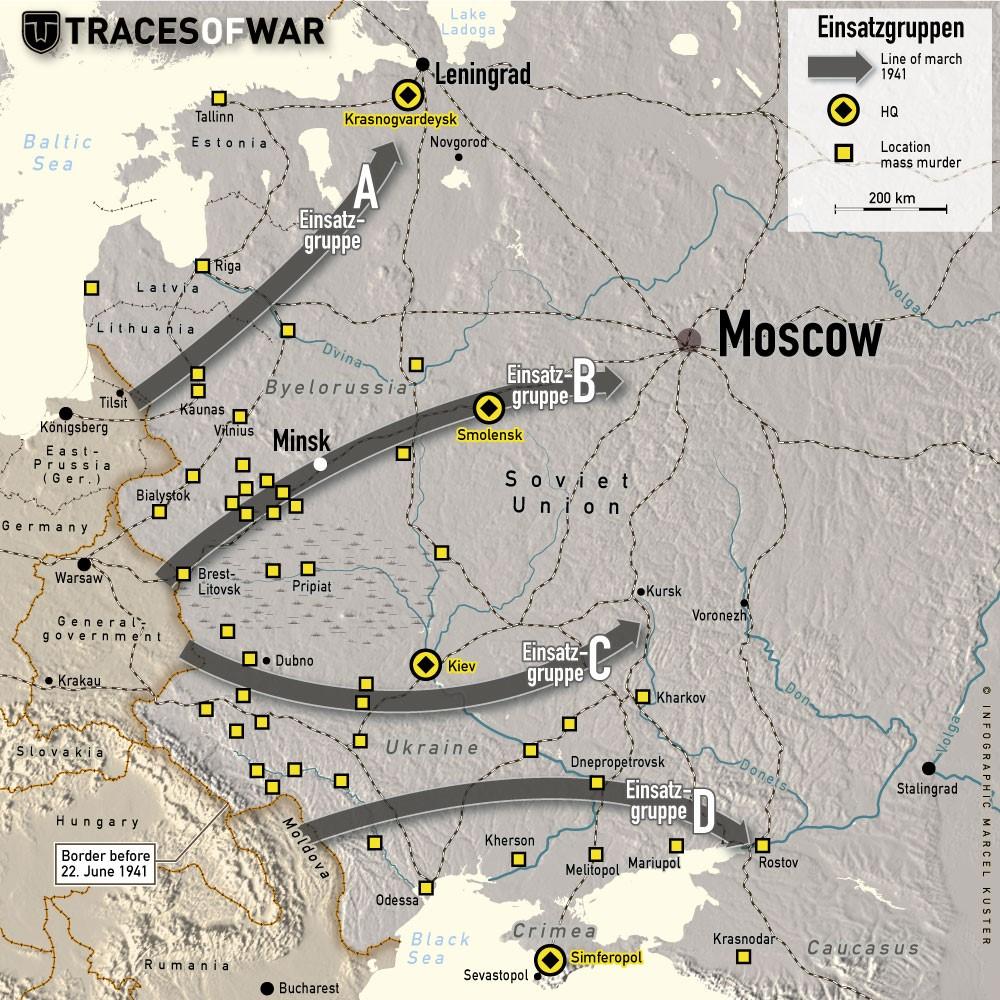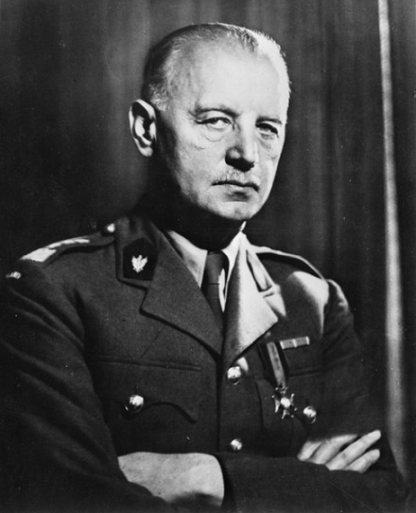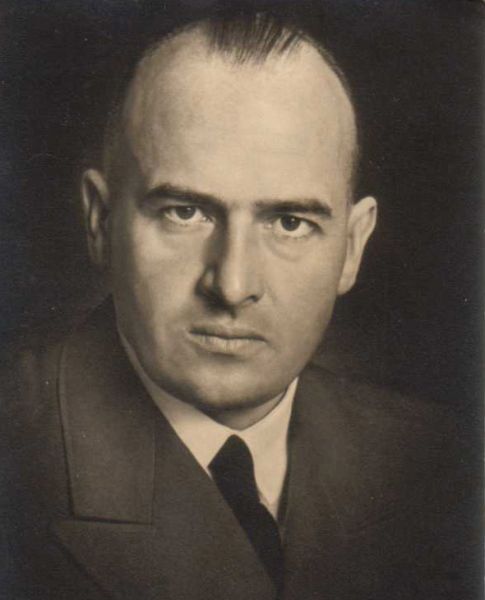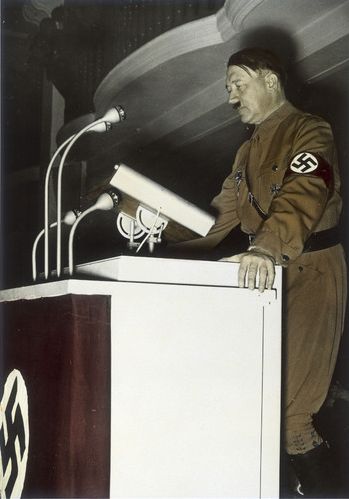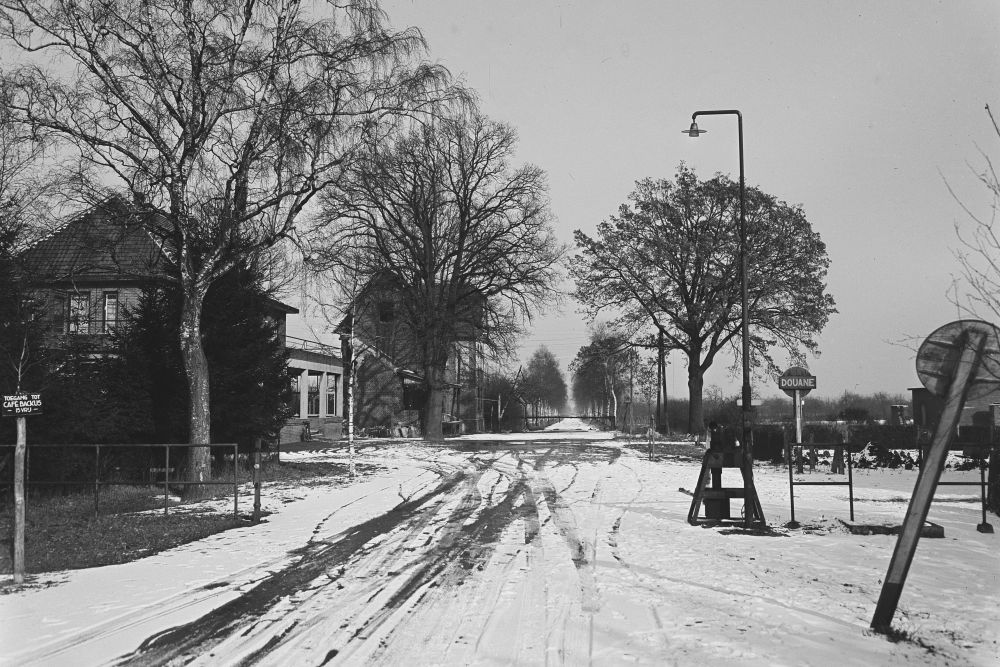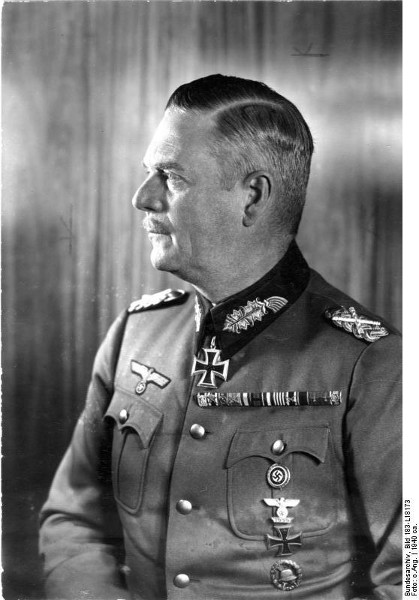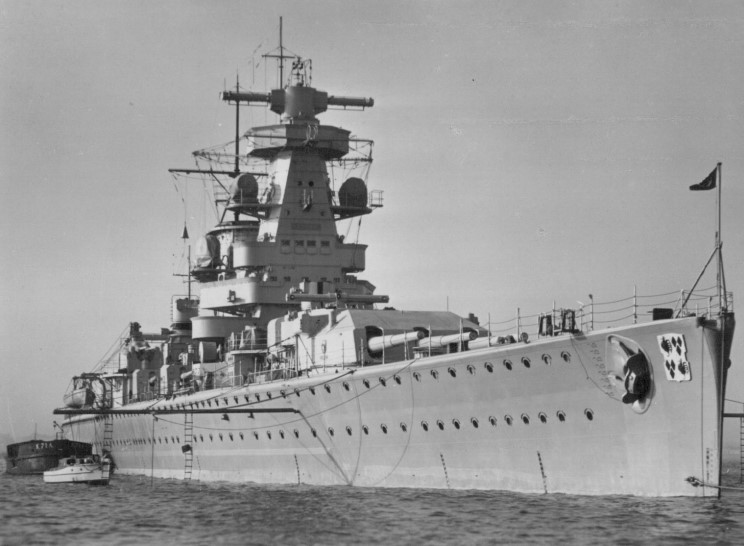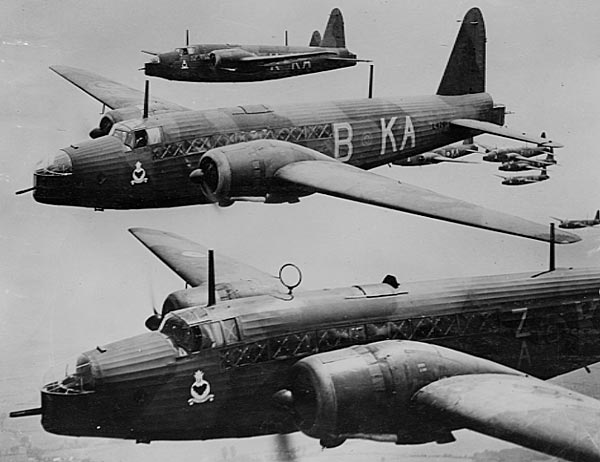-
24-01-1939: Reichsmarschall Hermann Göring charges Reinhard Heydrich chief of the R.S.H.A. with the "Endlösung der Judenfrage" (final solution of the Jewish question) by emigration or evacuation.
-
24-01-1939: Establishment in Germany of the "Reichsstelle für jüdische Auswanderung" (agency for Jewish emigration) led by Heydrich.
-
26-01-1939: The city of Barcelona is captured by Franco’ s troops.
-
30-01-1939: Hitler addresses the Reichstag declaring that the Jews in Europe will be exterminated in a future war.
-
10-02-1939: Japan occupies the island of Hainan.
-
13-02-1939: Extension of conscription in Germany. It can be imposed indefinitely.
-
15-02-1939: German decree about the deployment of female laborers in agriculture and in the household.
-
15-02-1939: Mid February the Dutch cabinet decides to establish a camp for Jewish refugees in Westerbork. Miscellaneous
-
21-02-1939: All German Jews are obliged by the Nazis to hand over all their gold and silver possessions.
-
27-02-1939: France and Great Britain recognize Franco's government.
-
01-03-1939: Entartete Kunst (degenerate art) is burned in Berlin.
-
01-03-1939: The Dutch Minister of Justice announces that approximately 8000 refugees will be admitted to the Netherlands.
-
14-03-1939: Hungary occupies the Czechoslovakian region of Ruthenia.
-
15-03-1939: Germany invades Czechoslovakia. Bohemia and Moravia are annexed by Germany. Slovakia becomes "independent" but remains occupied.
-
18-03-1939: Dictator Franco of Spain and president Salazar of Portugal sign a pact of mutual friendship and a non-aggression treaty, the so- called Iberian Pact.
-
23-03-1939: German troops occupy Memel.
-
26-03-1939: Franco joins the Anti Kominternpact.
-
28-03-1939: The nationalists occupy Madrid.
-
31-03-1939: The British and French Treaty of Guarantee for the protection of Poland is signed.
-
31-03-1939: The Spanish nationalists occupy Almeria Murcia and Cartagena.
-
01-04-1939: End of the Spanish civil war. Franco gains the victory over the Republicans with the support of Germany and Italy.
-
01-04-1939: The United Staten acknowledges Franco’s regime.
-
07-04-1939: Italy invades Albania
-
19-04-1939: The Netherlands. Elections for the provincial government. The NSB wins 3.89% of the votes.
-
22-04-1939: Italy and Germany sign the so-called Steel Pact.
-
28-04-1939: Hitler renounces the German-Polish non-aggression pact of 1934 and the German-British Naval pact of 1935.
-
28-04-1939: Hitler cancels the 1935 German-British naval treaty.
-
03-05-1939: Soviet-Union. Molotov succeeds Litwinow as People’s Commissioner of Foreign Affairs.
-
15-05-1939: The Lichtenburg concentration camp, initially intended as a camp for women, is closed and transferred to Ravensbrück in Mecklenburg
-
22-05-1939: Von Ribbentrop and Galeazzo Ciano sign the Steel Pact between Germany and Italy, the military version of the Anti - Kominternpact.
-
31-05-1939: A German - Danish non aggression pact is signed in Berlin.
-
20-06-1939: Germany. First test flight of the Heinkel He 176, the first rocket powered aircraft.
-
29-06-1939: In Italy restrictions against Jewish public servants, officers, physicians etc. become effective.
-
01-07-1939: In the Netherlands the distribution law of 1939 is proclaimed.
-
04-07-1939: The Reichsvertretung der Juden in Deutschland (state representation of Jews in Germany) is transformed by order of the Gestapo to a Reichsvereinigung (state association) entirely subordinate to the Gestapo.
-
04-07-1939: German Jews are excluded from government offices
-
21-07-1939: Slovakia gets a constitution which transforms the country into a clerical fascist single-party state. Mgr. Tiso becomes president.
-
25-07-1939 - 25-07-1939: Period of the fifth Colijn cabinet.
-
26-07-1939: Adolf Eichmann establishes the Zentralstelle für Jüdische Auswanderung (central agency for Jewish emigration) in Prague.
-
26-07-1939: The United Staten renounces the trade agreement with Japan.
-
10-08-1939: The fifth Colijn cabinet resigns.
-
10-08-1939: De Geer forms his second cabinet. For the first time socialist ministers have a seat in the cabinet (ir.J.W.Albarda and dr. J. van den Tempel).
-
11-08-1939 - 11-08-1939: Hitler meets Mussolini in Salzburg.
-
22-08-1939: Hitler addresses his generals at the Obersalzberg on the eve of the attack on Poland.
-
23-08-1939: The foreign ministers of the Soviet-Union and Germany, respectively Molotov and Von Ribbentrop sign the non-aggression pact between the two countries.
-
25-08-1939: Great Britain and Poland sign a mutual assistance treaty.
-
26-08-1939: Hitler guarantees the neutrality of Belgium, the Netherlands, Luxemburg, Denmark and Switzerland.
-
26-08-1939 - 26-08-1939: France and England negotiate with Hitler about the Danzig issue and the Corridor.
-
27-08-1939: Test flight of the first jet aircraft, the Heinkel He 178.
-
27-08-1939: The Red Army defeats Japan's 6th Kwantung Army in the Battle of the Khalkhin Gol River.
-
28-08-1939: The Dutch government proclaims general mobilization. General Reijnders is appointed Commander-in-Chief of all armed forces.
-
29-08-1939: Queen Wilhelmina of the Netherlands and King Leopold III of Belgium offer their services as mediator in the German-Polish conflict.
-
30-08-1939: Start of mobilization in Poland.
-
31-08-1939: Hitler issues Weisung 1 (instruction): The German Kriegsmarine is to wage a trade war against England with 23 U-boats.
-
31-08-1939: Attack on the radio station in Gleiwitz, staged by the Germans. Hitler uses this incident to justify the attack on Poland.
-
01-09-1939: A German army of 53 divisions supported by 1,600 airplanes invades Poland across the German and Slovakian borders. Plan White under command of General Walther von Brauchitsch is intended to disable 24 Polish divisions by a rapid encirclement and the severing of lines of supply and communications.
-
01-09-1939: Euthanasia order by Hitler, the so-called T-4 program. The mentally ill were to be murdered in some five special institutions.
-
01-09-1939: Reichstag speech by Hitler: "Und von jetzt ab wird jede Bombe mit Bombe vergolten ..." "Ich will nichts anderes sein als der erste Soldat des deutschen Reiches".
-
01-09-1939: German Jews are not allow outside after 20:00 hours in winter and after 21:00 in summer.
-
01-09-1939: At 4:45 AM, the German battleship Schleswig-Holstein opens fire on the Polish garrison on the Westerplatte peninsula.
-
02-09-1939: France and Great Britain discuss the possibility of interfering in the German-Polish conflict.
-
02-09-1939: Italy proposes an international conference to solve the Polish-German conflict.
-
02-09-1939: In Poland German troops obtain easy victories in Silesia, Pommerania, eastern Prussia and in Czestochowa.
-
02-09-1939: German Heeresgruppe Süd commanded by General List threatens Krakow, Poland.
-
02-09-1939: Germany agrees to respect the neutrality of Norway.
-
02-09-1939: The Netherlands. The first decree on fuel rationing is effective.
-
03-09-1939: 11:00 hours, Great Britain declares war on Germany.
-
03-09-1939: The British Admiralty announces the blockade of German harbors.
-
03-09-1939: The German U 30 sinks the British passenger liner SS Athenia, resulting in 112 dead including 28 Americans.
-
03-09-1939: 17:00 hours, France declares war on Germany
-
03-09-1939: Australia, India and new Zealand declare war on Germany
-
03-09-1939: Winston Churchill is appointed First Lord of the Admiralty.
-
04-09-1939: Japan declares itself neutral in the Polish-German conflict.
-
04-09-1939: Bombers of the RAF launch their first attacks on Nazi warships near the Bight of Helgoland but the government prohibits attacks on targets in Germany.
-
04-09-1939: Prime Minister de Geer delivers a government statement to the Tweede Kamer pertaining to Dutch neutrality.
-
05-09-1939: The United States declares herself neutral in the Polish-German conflict.
-
05-09-1939: German troops reach the line on the river Weichsel in Poland.
-
06-09-1939: In Poland, German Heeresgruppen Süd and Nord advance on Warsaw and Krakow is taken.
-
06-09-1939: The Polish government leaves Warsaw.
-
06-09-1939: South-Africa declares war on Germany.
-
07-09-1939: French patrols cross the German border in several places.
-
07-09-1939: The Polish garrison on the Westerplatte peninsula surrenders after a week of heavy fighting.
-
08-09-1939: British merchant ships in the North sea and the Atlantic Ocean are obliged to sail in protected convoys from now on.
-
08-09-1939: German troops reach the city of Radom, Poland approximately 62 miles south of Warsaw.
-
09-09-1939: A German tank unit launches its first attack on Warsaw but is driven back.
-
09-09-1939: First B.E.F. (British Expeditionary Force) units, commanded by General Gort leave for France.
-
09-09-1939: Instruction from the government to General Reijnders for the defense of Fortress Holland and the Grebbeberg.
-
10-09-1939: Canada declares war on Germany.
-
10-09-1939: The British submarine HMS Triton mistakenly torpedoed the British submarine HMS Oxley. Only two of the 53 crew survive.
-
11-09-1939: German troops capture entire Upper Silesia.
-
12-09-1939: Small-scale French actions against Germany without success.
-
13-09-1939: France forms a War Cabinet under Prime Minister Daladier.
-
13-09-1939: The 1st Squadron of the Polish 27th Cavalry Regiment breaks through the German lines at Maliszew, takes the village and takes many prisoners.
-
14-09-1939: A Dutch military aircraft is shot down by a German fighter north of the Waddenzee.
-
14-09-1939: German troops encircle the Polish capital of Warsaw.
-
16-09-1939: Warsaw rejects the German order to surrender.
-
17-09-1939: The Polish government goes into exile in Romania.
-
17-09-1939: Soviet troops occupy undefended eastern Poland.
-
17-09-1939: The Soviet Minister of Foreign Affairs Molotov declares a Polish government no longer exists.
-
17-09-1939: The British aircraft carrier H.M.S. Courageous is sunk by German U 29 south of Ireland.
-
18-09-1939: Fierce fighting along the river Bzura in Poland. 19 Polish divisions are surrounded and eliminated.
-
18-09-1939: Members of the Polish government are detained by the Romanian government under German pressure.
-
19-09-1939: Hitler holds a triumphal entry into the city of Danzig Poland.
-
19-09-1939: German and Soviet troops meet near Brest-Litovsk Poland.
-
19-09-1939: The first British B.E.F. troops arrive in France.
-
19-09-1939: Memorandum by Churchill on the obstruction of German ore transports through Norwegian territorial waters.
-
19-09-1939: Conference of the Oslo states in Copenhagen.
-
20-09-1939: German-Russian talks on the demarcation of the border in Poland.
-
20-09-1939: Engagements between German and French fighters.
-
21-09-1939: German-Russian agreement on the demarcation of the border in Poland.
-
21-09-1939: A Fascistic Romanian group the Iron Guard murders the Romanian Prime Minister Armand Calinescu.
-
21-09-1939: Heydrich orders SS Einsatzgruppen in Poland to herd Jews in ghetto’s near railways in preparation of the "Endlösung"
-
22-09-1939: In Lvov Poland Soviet troops relieve German troops.
-
23-09-1939: The German supreme command declares the Polish campaign terminated.
-
23-09-1939: Local skirmishes on the French-German border.
-
26-09-1939: Near Helgoland a K.L.M. aircraft is shot down by a German fighter.
-
26-09-1939: The Soviet-Union carries through reforms in Eastern Poland after the Soviet model.
-
27-09-1939: Warsaw surrenders after heavy bombardments.
-
27-09-1939: A German military government is established in western Poland.
-
27-09-1939: Call for peace by U.S. President Roosevelt to Hitler.
-
28-09-1939: Ten Polish divisions are surrounded near the fortress of Modlin near Kutno and surrender.
-
29-09-1939: Estonia and the Soviet- Union sign a treaty of mutual assistance. The Soviet-Union gains access to various air and naval bases.
-
29-09-1939: The Ministers of Foreign Affairs, Von Ribbentrop of Germany and Molotov of the Soviet-Union agree on a new partition of Poland.
-
29-09-1939: The United States lifts the arms embargo against belligerents.
-
30-09-1939: In Paris a Polish government in exile is established led by General Sikorski.
-
30-09-1939: The German battleship Graf Spee sinks the British ship Clement.
-
01-10-1939: Great Britain calls another 250,000 men to arms.
-
01-10-1939: Polish defenders of the Hela peninsula surrender.
-
01-10-1939: The central refugee camp at Westerbork, subordinate to the Ministry of Foreign Affairs is opened in early October.
-
02-10-1939: Representatives of 21 countries on continental America declare a safety zone off the coast of each country. Any act of war within the zone is a hostile act.
-
03-10-1939: The first units of the B.E.F. destined for the Belgian front arrive in France.
-
05-10-1939: Estonia and the Soviet Union sign a treaty of mutual assistance; the Soviet Union gains access to various air and naval bases.
-
06-10-1939: Hitler calls for an international conference on the Jewish question and other subjects.
-
06-10-1939: German troops break the last Polish resistance.
-
07-10-1939: After heavy bombardments Japan captures a few cities in southern China.
-
07-10-1939: Hungary and Romania demobilize their troops on their common border.
-
07-10-1939: German aircraft attack British minesweepers.
-
08-10-1939: A German flying boat is shot down by British fighters.
-
10-10-1939: Lithuania and the Soviet Union sign a treaty of mutual assistance. Vilnjus is returned to Lithuania and the Soviet Union gains access to various air and naval bases.
-
10-10-1939: Admiral Reader draws Hitler’s attention to the strategic importance of Norway to Germany.
-
11-10-1939: The French Prime Minister Daladier rejects Hitler's peace proposals of October 6.
-
12-10-1939: The British Prime Minister Chamberlain rejects Hitler’s peace proposals of October 6.
-
12-10-1939: Finland and the Soviet Union start negotiations; the Soviets demand the establishment of some naval bases and border corrections on the Karelian Isthmus.
-
12-10-1939: Hans Frank is named Gauleiter (governor) of Poland.
-
12-10-1939: In Austria, the first Jewish civilians are deported.
-
13-10-1939: Sweden mobilizes her reservists.
-
13-10-1939: The British navy sinks three German U boats.
-
14-10-1939: U 47, commanded by Günther Prien, penetrates the British naval base at Scapa Flow and torpedoes H.M.S. Royal Oak.
-
15-10-1939: Germany and Estonia sign a treaty on the Germanisierung (Germanization) of Estonians of German descent.
-
16-10-1939: German planes damage British war ships in the Firth of Forth.
-
16-10-1939: Skirmishes on the French-German border between French and German troops.
-
17-10-1939: Finland declares its readiness to evacuate the island of Suusaari; the Soviet Union guarantees Finnish independence.
-
17-10-1939: French troops evacuate a part of occupied Germany.
-
17-10-1939: British air strikes on Emden, Germany.
-
17-10-1939: German air strikes on the British naval base at Scapa Flow.
-
18-10-1939: Indian Prime Minister Gandhi refuses Great Britain moral support in the war against Germany.
-
19-10-1939: The Scandinavian countries declare themselves strictly neutral in the Soviet-Finnish border conflict.
-
19-10-1939: Turkey, France and Great Britain sign a mutual assistance treaty.
-
19-10-1939: Hitler finalizes his first plan of attack on the West, Fall Gelb.
-
23-10-1939: The American merchant vessel City of Flint is seized by the German battleship Deutschland and escorted to the Russian port of Murmansk.
-
24-10-1939: British planes fly reconnaissance missions over Berlin, Hamburg and Magdeburg.
-
25-10-1939: In elections in the Soviet occupied zone of Poland, the Communist candidates win 91% of the votes.
-
26-10-1939: Krakow becomes the capital of occupied western Poland.
-
26-10-1939: A decree is issued enabling compulsory labor for Polish Jews between the ages 14 and 60.
-
28-10-1939: On Czechoslovak Independence Day in Prague, disturbances erupt.
-
28-10-1939: The Lithuanian army takes possession of the area around Vilnjus.
-
29-10-1939: Second revised Marschanweisung (schedule) for Fall Gelb
-
30-10-1939: Germany and Lithuania sign a treaty on the Germanisierung of Latvians of German descent.
-
30-10-1939: The Soviet Union annexes its occupied territory in eastern Poland.
-
30-10-1939: The Netherlands. Sugar is rationed to 2,2 lbs every 3 weeks.
-
31-10-1939: The British navy starts a world wide hunt for the German battleship Graf Spee.
-
01-11-1939: Germany annexes Danzig, the Polish corridor, the eastern part of Upper Silesia, the region around Lodz and the district Ciechanow.
-
02-11-1939: The American House of Representatives passes a new Neutrality Act which enables belligerent countries to buy weapons in the United States using cash and carry.
-
02-11-1939: A smuggler of uniforms is discovered near Denekamp.
-
03-11-1939: Finland refuses to give up the island of Hango.
-
04-11-1939: By passing the Cash and Carry Act by Congress, the American neutrality law is amended in favor of Great Britain.
-
06-11-1939: French-German dogfights over the French-German border.
-
07-11-1939: King Leopold of Belgium and Queen Wilhelmina of the Netherlands call for peace and offer their services as mediators.
-
08-11-1939: Hitler escapes an attempt at murder in the Bürgerbraukeller in Munich.
-
08-11-1939: The Netherlands and Belgium congratulate Hitler with his escape from the attempt in the Bürgerbraukeller in Munich.
-
09-11-1939: Venlo incident. Members of the Gestapo abduct two members of the British secret service near the Dutch border. A Dutch officer looses his life in the process.
-
09-11-1939: All military leave is cancelled. Increased alert on the border. Partial inundation is started.
-
11-11-1939: The Netherlands. Peas are rationed, 17.6 ounces per four weeks.
-
12-11-1939: British and French Prime Ministers reject the Belgian-Dutch offer at mediation.
-
13-11-1939: France and Great Britain ensure Japan they will reduce/withdraw their forces in northern China.
-
13-11-1939: Finland ends negotiations with the Soviet Union and mobilizes her army.
-
13-11-1939: King Carol of Romania offers to mediate between the belligerent parties.
-
14-11-1939: Hitler refuses the Belgian-Dutch offer at mediation.
-
15-11-1939: The British merchantman Africa Shell is sunk by the German battleship Admiral Graf Spee.
-
16-11-1939: All belligerent parties reject the mediation offer by King Carol of Romania.
-
17-11-1939: German sources report the closing of three universities in Bohemia and Moravia because of their anti-German conduct.
-
17-11-1939: France and Great Britain decide to coordinate their warfare.
-
17-11-1939: The Kriegsmarine is ordered to attack all shipping, clearly identifiable as hostile, without warning. This is actually the beginning of the unrestricted submarine warfare between Great Britain and Germany.
-
18-11-1939: The "Simon Bolivar" a Dutch passenger liner is sunk by a magnetic mine. An estimated 86 out of the 400 passengers lose their lives, mainly women and children.
-
19-11-1939: The Netherlands. Documents pertaining to Dutch war policy are drafted to be deposited by Dutch delegates in Brussels, London and Paris.
-
22-11-1939: German aircraft lay magnetic mines off the British coast.
-
23-11-1939: The armed British vessel Rawalpindi is sunk by the German battleship Scharnhorst.
-
23-11-1939: Polish Jews over 10 years of age are obliged to wear a yellow Star of David.
-
26-11-1939: The Soviet Union demands the withdrawal of Finnish troops from her border.
-
28-11-1939: According to a Soviet declaration, Soviet troops north of Leningrad are shot at by the Finns.
-
29-11-1939: The Soviet Union severs diplomatic relations with Finland.
-
29-11-1939: Romania declares itself neutral in the Finnish-Soviet conflict.
-
30-11-1939: Soviet troops invade Finland, Helsinki is bombed.
-
30-11-1939: Swedish protest against mine laying in her territorial waters by Germany.
-
01-12-1939: The Soviet attack on the Karelian isthmus meets stiff resistance.
-
01-12-1939: The Finnish cabinet resigns and is succeeded by a cabinet led by Ryti.
-
01-12-1939: Introduction of the Navicert system by the Allies. A navy certificate is a document of a ship from a neutral country, declaring the cargo is not shipped to a nation at war.
-
02-12-1939: The German battleship Graf Spee sinks the British ship Doric Star.
-
03-12-1939: Reports in the press indicate, German troops are assembling on the Hungarian border.
-
03-12-1939: Finnish troops withdraw to the Mannerheim line a 15.5 miles long defensive line across the Karelian isthmus.
-
03-12-1939: A British air strike on Helgoland.
-
04-12-1939: The British battleship H.M.S. Nelson is damaged by a magnetic mine.
-
05-12-1939: Soviet troops reach the Mannerheim line.
-
07-12-1939: A Soviet unit reaches Lake Kiant in central Finland.
-
07-12-1939: Sweden mobilizes part of her army and calls upon 15 drafts.
-
07-12-1939: The British destroyer H.M.S. Jersey is damaged by a torpedo.
-
08-12-1939: The Soviet navy imposes a blockade on the Finnish coast.
-
08-12-1939: Three German submarines are sunk.
-
09-12-1939: The League of Nations convenes without the Soviet Union on the subject of the Finnish-Soviet war. The matter is moved forward to the meeting of December 11.
-
09-12-1939: The German vessel Adolf Leonhart is sunk by its own crew in the Atlantic ocean off the coast of Angola after it has been intercepted by British H.M.S. Shropshire. The British take the crew aboard.
-
11-12-1939: The Norwegian fascist leader Vidkun Quisling meets with Adolf Hitler and warns him of a British action in Norway.
-
11-12-1939: The League of Nations wants to know within 24 hours whether the Finland and the Soviet Union are willing to end hostilities.
-
12-12-1939: The Belgian government declares her willingness to lend military support to the Netherlands and Luxemburg in case these countries come under attack.
-
12-12-1939: France and Great Britain send weapons to Finland.
-
12-12-1939: Hitler orders to draft plans for an attack on Norway.
-
13-12-1939: During the battle of the River Plate the German battleship Admiral Graf Spee engages the British cruisers H.M.S. Exeter, H.M.S. Ajax and H.M.N.Z.S. Achilles. The Graf Spee seeks shelter in Montevideo harbor.
-
14-12-1939: The Soviet Union is expelled from the League of Nations, after being declared the aggressor in the war with Finland.
-
17-12-1939: The German pocket battleship Graf Spee is scuttled by her own crew after local authorities had forced commander Kapitän-zur-See Langsdorff to set sail.
-
18-12-1939: British air raid on the German ships in Wilhelmshafen with 22 bombers. More than half of the participating aircraft are shot down or have to make an emergency landing. No hits are posted.
-
19-12-1939: In order to prevent passengers and crew from being taken prisoner-of-war by H.M.S. Hyperion, the German passenger liner Columbus is scuttled by her own crew in the Atlantic Ocean, 450 nautical miles east of Cape May, New Jersey, U.S.A. Passengers and crew are taken aboard the American heavy cruiser U.S.S. Tuscaloosa as ship wrecked persons, not as PoWs since the U.S. is still neutral.
-
21-12-1939: Soviet forces suffer a defeat near Salla in Finland.
-
21-12-1939: Dogfights between French and German aircraft over the Maginot line.
-
22-12-1939: The Finnish army launches a counter offensive against the Soviet invaders.
-
23-12-1939: The first Canadian troops (7,500 men) arrive in Great Britain.
-
24-12-1939: The press reports Chinese successes against Japanese forces north of Hunan and southwest of Hubel.
-
25-12-1939: Soviet attacks on the Mannerheim line are repulsed.
-
28-12-1939: Soviet forces are pushed back by the Finns, north of Lake Ladoga.
-
31-12-1939: Finnish forces gain a victory over Soviet forces near Somussala, Finland.
-
31-12-1939: The British Expeditionary Force in France numbers 160,000 men.
